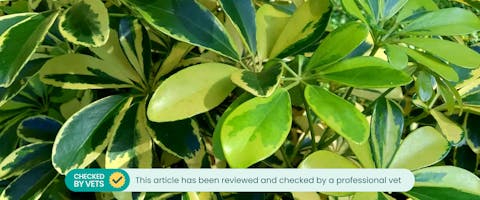Updated 13/07/2023
The umbrella plant, also known as ‘Schefflera’, aka, the apartment dweller's dream. Thanks to its lush, abode-brightening umbrella leaves and its ability to grow in low light, it's no wonder that the umbrella tree plant is so popular amongst us humans.
However, plant- and pet parents alike should always proceed with caution when it comes to welcoming home a new house plant. After all, there are so many popular plants that can do our pets harm. And so, it begs the question: is an umbrella plant toxic to dogs? Let’s explore.
Trending posts
Purr-use some of the top blogs our members have been loving this month- Top male dog names for your new furry friendGot a new furry family member in your pack? Check…

- Top female dog names for your new fluffy palWelcoming a new pooch into your family? Explore…

- 250+ gray cat names your silver feline will loveRecently welcomed a fluffy gray bundle of joy into…

- What are normal pet sitting rates?Discover the average pet sitting rates for animals…

- Unique dog names to stand out from the packDare to be different with our list of the best…

Are umbrella plants toxic to dogs?
Unfortunately, yes - all parts of the umbrella plant contain toxic compounds (including insoluble calcium oxalate crystals and saponins) which makes it toxic to dogs. Eating one can result in a whole host of nasty, unpleasant symptoms for our poor pooch pals - let's take a look at those down below.
Symptoms
If your pet chews or eats an umbrella plant, it can release toxic compounds (e.g. insoluble calcium oxalate crystals), causing irritation to any tissue it comes into contact with. The insoluble calcium oxalate crystals resemble sharp needles and can become embedded in a dog’s mouth, causing intense pain. Additionally, the following symptoms may also present:
- Drooling
- Swelling of the mouth, gums, or face
- Agitation or unsettled behavior (e.g. pacing)
- Pawing at the mouth
- Vomiting/diarrhea
- Irritation or swelling of the mouth
- Itchy skin
In some cases, the swelling of the mouth and throat can also lead to breathing difficulties.
Diagnosis
If you suspect your dog ate umbrella plant, or they are displaying any of the symptoms above, do contact your veterinarian as soon as you can.
Your vet will take a thorough history and do a physical exam. Take photos of the plant(s) that your dog has eaten, as this will really help your vet in diagnosing your pet. If the diagnosis is unclear, your vet may run a series of tests (e.g. blood work) to confirm the diagnosis and rule out other potential causes of your dog’s symptoms. However, in cases of confirmed umbrella plant poisoning, treatment will usually begin very quickly.
Treatment
Your veterinarian will first aim to alleviate your pooch's initial pain by washing out their mouth, face, and affected areas. From there, treatment may include:
- Removing the offending toxins from the face, skin, and mouth
- Flushing out the toxins from your dog's stomach/system
- Administering any medications your vet deems necessary
- If your dog is suffering from more severe symptoms, IV fluids may also be administered, and it's likely your pooch may need to be warded for observation
Remember, each case is different and the advice above should act only as a guideline. Also, as some mischievous dogs may gobble more than one type of poisonous plant in one go, additional treatment may be needed to address the symptoms caused by those plants. Only your veterinarian will be able to give you advice and recommend a course of treatment for your own dog, this also means that you shouldn't attempt any at-home treatments without checking with your vet! In any cases of suspected poisoning, it's important to contact your vet as soon as possible.
Meet our veterinary expert, Jnanee
This article has been checked by veterinarian Jnanee Krishnasamy, BVSc (Massey). Dr Jnanee is a small animal veterinarian. She was born in sunny Singapore and spent her formative years there, before studying veterinary medicine at
Massey University. Since graduating from vet school, Dr Jnanee has worked in a variety of settings that include private practice, shelter medicine, and veterinary telemedicine. Due to her varied experiences, she is well-informed on many aspects of the veterinary industry!
Other plants that are poisonous for dogs
Of course, there are plenty more poisonous plants that dogs should avoid. Here are just a few more pet parents (and pooches) should watch out for:
- Wisteria
- Tulips
- Geraniums
- Peace lilies
- Chrysanthemums

